句型转换3同义句
- 格式:doc
- 大小:45.50 KB
- 文档页数:5
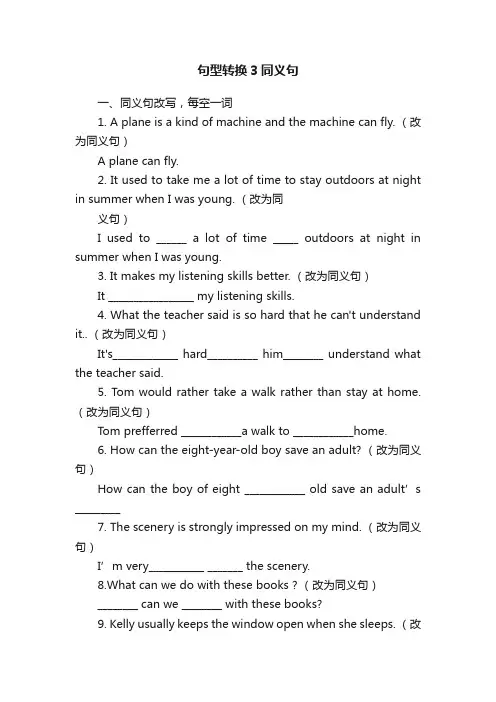
句型转换3同义句一、同义句改写,每空一词1. A plane is a kind of machine and the machine can fly. (改为同义句)A plane can fly.2. It used to take me a lot of time to stay outdoors at night in summer when I was young. (改为同义句)I used to ______ a lot of time _____ outdoors at night in summer when I was young.3. It makes my listening skills better. (改为同义句)It _________________ my listening skills.4. What the teacher said is so hard that he can't understand it.. (改为同义句)It's_____________ hard__________ him________ understand what the teacher said.5. Tom would rather take a walk rather than stay at home. (改为同义句)Tom prefferred ____________a walk to ____________home.6. How can the eight-year-old boy save an adult? (改为同义句)How can the boy of eight ____________ old save an adult’s _________7. The scenery is strongly impressed on my mind. (改为同义句)I’m very___________ _______ the scenery.8.What can we do with these books ? (改为同义句)________ can we ________ with these books?9. Kelly usually keeps the window open when she sleeps. (改为同义句)Kelly usually sleeps the window .10.The poor mother doesn’t have enough money to send her child to school. (改为同义句)The poor mother can’t pay for her chi ld’s education.11. What will you do if your parents don’t allow you to join us? (改为同义句)your parents don’t allow you to join us?12. So cial situations don’t bother you at all if you are confident enough. (改为同义句)Social situa tions don’t bother you if you are confident enough.13. Work hard, or you’ll make me disappointed.(改为同义句)Work hard, or you’ll .14. I would hurry to call the hospital if I saw an accident in the street. (改为同义句)I would call the hospital if I saw anaccident in the street.15. Her money ran out in the bookstore. (改为同义句)His money was ________ _________ .16. You are from Be ijing. I’m from Beijing ,too. (改为同义句)________ ________ you _________ ________I am from Beijing .17.Our school football team won the prize for the football match yesterday. (改为同义句)The Price of the football match _______ _______our school football team yesterday.18.You should shake hands when you meet someone in China for the first time. ( 改为同义句)You ___ ___ ___ __hands when you meet someone in China for the first time 19.The coat is too expensive for me. (改为同义句) The coat ______ ______ ______ ______ me .20. Who is the owner of the red bicycle?Who ________ the red bicycle __________ ____________? (同义句)21. They have run out of all the paper already. (同义句)They have ________ ________ all the paper already.22.Tina and Peter got married two years ago. (改为同义句)Tina_____ _____ ______Peter two years ago.23. My car broke down yesterday. I can’t go there with you. (改为同义句)There was _____________- with my car yesterday. I can’t go there with you.24. Her parents often provide lots of money for her. (改为同义句)Her parents often ________ _______ _________ lots of money.25.You shouldn’t behave like that at the table. (改为同义句)You ________ _________ to behave like that at the table.26. How was your visit to France last month?________ was your visit to France ________ last month? (改为同义句)27. My French has become better. (改为同义句)My French has ________.28. Lucy has made up her mind that she won’t do that again.(改为同义句)Lucy has _______ _______ to do that again.29. I'm sure that man is Mr. Green. (改为同义句)That man ________ ________ Mr. Green.30. It began to rain so they didn't go window-shopping. (改为同义句)They didn't go window-shopping ________ ________ the rain.二、同义句改写,每空一词1. This is the most boring journey that I have ever heard of.I have ________ heard of ________ a boring journey before.2. My father seems to be very angry.________ seems that my father ________ very angry.3. He could do it well.He ________ ________ ________ do it well.4. The captain is the happiest of all the players.The captain is ________ ________ any other player.5. Taking exercise often can make you healthy.It's good ________ your ________ to take exercise often.6. The children played happily in the zoo yesterday.The children ________ ________ in the zoo yesterday.7. The problem is too difficult for me to work out.The problem isn't ________ ________ for me to work out.8. Hurry up, and you'll be on time for the party.________ you ________ hurry, you'll be late for the party.9. It is five years since he left his hometown.He has ________ ________ from his hometown for five years.10. The film began at 2:00 p. m. and ended at 4:30 p. m.The film ________ two and a half ________.11. That lady is my new English teacher. She is wearing red clothes.The lady ________ ________ is my new English teacher.12. With a polite goodbye, Mr. Green left the house.________ ________ good-bye politely, Mr. Green left the house.13. I spent four hundred yuan in buying that recorder.That recorder ________ ________ four hundred yuan.14. “Can I borrow your bike?” he asked me.He asked me ________ I ________ ________ him the bike.15. There are more people in America than in England.The ________ in America is ________ than ________ in England.16. He can't decide where he should stay for the night.He can't decide ________ ________ ________ for the night.17. You needn't thank me, sir.________ ________ ________ for you to thank me.18. The ID card is not the only thing that I have lost.The ID card is not the only thing ________ ________.19. How is the weather in Shanghai?What ________ ________ ________ does Shanghai have?20. His father has been dead for two years.It's two years ________ his father ________.21. Tom didn’t watch TV that evening. He listened to music.Tom listened to music ______ ______ watching TV that evening.22. “Will you go home tomorrow?” the mother asked her son.The mother asked her son ________ he ________go home the next day.23. Mr. Smith wanted to know where he could get the information.Mr. Smith wanted to know ________ ________ get the information.24. You can do it in class. You can also do it at home.You can do it ________ in class ________ at home.25. “I’ll return the DVDs to Mary as soon as possible”, said Mike.Mike said he ___________ ___________ back the DVDs to Mary as soon as possible.26. Don’t throw wast e paper on the ground, please.You ___________ ___________ to throw waste paper on the ground.27. Tom can’t speak French. Jack can’t speak French, either.__________ Tom __________ Jack can speak French.28. Mike will come if you invite him.Mike __________ come __________ you invite him.29. The small boy stopped crying after he saw his mother.The small boy ___________ stop crying ___________ he saw his mother.30. The fish will go bad, so you’d better put it in the fridge.The fish will go bad __________ you __________ put it in the fridge.二.1. never; such 2. It; is 3. was able to 4. happier than 5. for; health 6. enjoyed themselves 7. easy enough 8. If; don't 9. been away 10. lasted; hours 11. in red 12. After saying 13. cost me 14. if/whether; could lend 15. population; larger; that 16. where to stay 17. There's no need 18. that's missing 19. kind of weather 20. since; died 21. instead of 22. whether/if; would 23. where to 24. either; or 25. would, give 26. aren’t’ allowed / ought to 27. Neither nor 28. won’t unless 29. didn’t, until30. if, don’t。
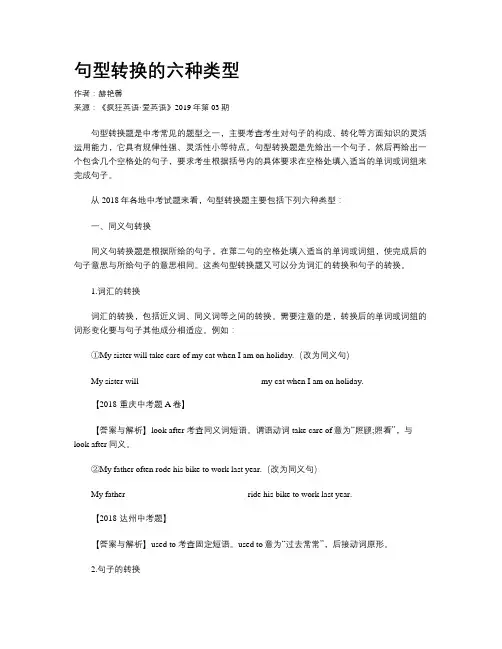
句型转换的六种类型作者:赫艳馨来源:《疯狂英语·爱英语》2019年第03期句型转换题是中考常见的题型之一,主要考查考生对句子的构成、转化等方面知识的灵活运用能力,它具有规律性强、灵活性小等特点。
句型转换题是先给出一个句子,然后再给出一个包含几个空格处的句子,要求考生根据括号内的具体要求在空格处填入适当的单词或词组来完成句子。
从2018年各地中考试题来看,句型转换题主要包括下列六种类型:一、同义句转换同义句转换题是根据所给的句子,在第二句的空格处填入适当的单词或词组,使完成后的句子意思与所给句子的意思相同。
这类句型转换题又可以分为词汇的转换和句子的转换。
1.词汇的转换词汇的转换,包括近义词、同义词等之间的转换。
需要注意的是,转换后的单词或词组的词形变化要与句子其他成分相适应。
例如:①My sister will take care of my cat when I am on holiday.(改为同义句)My sister will______________ ______________my cat when I am on holiday.【2018·重庆中考题A卷】【答案与解析】look after 考查同义词短语。
谓语动词take care of意为“照顾;照看”,与look after同义。
②My father often rode his bike to work last year.(改为同义句)My father____________________________ ride his bike to work last year.【2018·达州中考题】【答案与解析】used to 考查固定短语。
used to意为“过去常常”,后接动词原形。
2.句子的转换句子的转换包括简单句之间、简单句和复合句之间、复合句和复合句之间的转换。
在答题的时候,考生要根據句子的类型,注意连接词的使用。
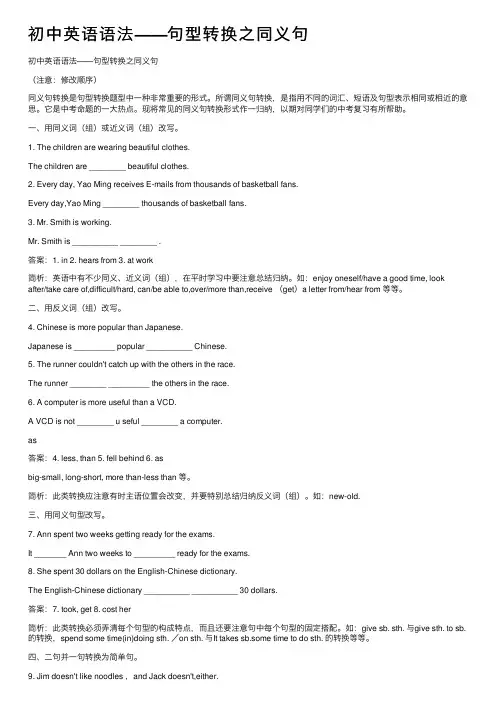
初中英语语法——句型转换之同义句初中英语语法——句型转换之同义句(注意:修改顺序)同义句转换是句型转换题型中⼀种⾮常重要的形式。
所谓同义句转换,是指⽤不同的词汇、短语及句型表⽰相同或相近的意思。
它是中考命题的⼀⼤热点。
现将常见的同义句转换形式作⼀归纳,以期对同学们的中考复习有所帮助。
⼀、⽤同义词(组)或近义词(组)改写。
1. The children are wearing beautiful clothes.The children are ________ beautiful clothes.2. Every day, Yao Ming receives E-mails from thousands of basketball fans.Every day,Yao Ming ________ thousands of basketball fans.3. Mr. Smith is working.Mr. Smith is __________ ________ .答案:1. in 2. hears from 3. at work简析:英语中有不少同义、近义词(组),在平时学习中要注意总结归纳。
如:enjoy oneself/have a good time, look after/take care of,difficult/hard, can/be able to,over/more than,receive (get)a letter from/hear from 等等。
⼆、⽤反义词(组)改写。
4. Chinese is more popular than Japanese.Japanese is _________ popular __________ Chinese.5. The runner couldn't catch up with the others in the race.The runner ________ _________ the others in the race.6. A computer is more useful than a VCD.A VCD is not ________ u seful ________ a computer.as答案:4. less, than 5. fell behind 6. asbig-small, long-short, more than-less than 等。
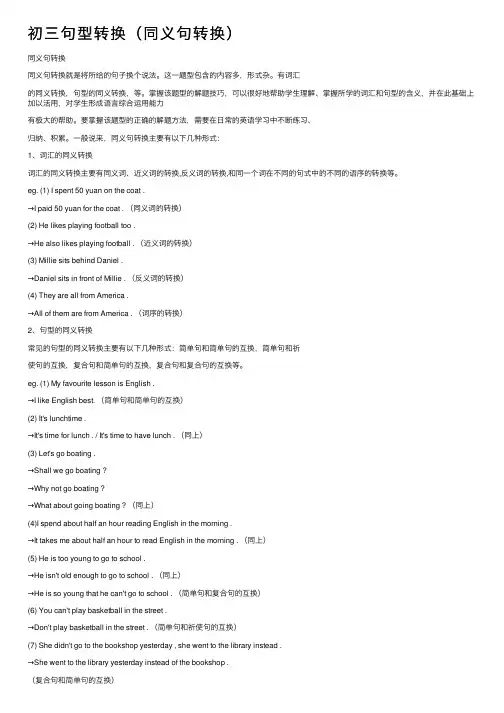
初三句型转换(同义句转换)同义句转换同义句转换就是将所给的句⼦换个说法。
这⼀题型包含的内容多,形式杂。
有词汇的同义转换,句型的同义转换,等。
掌握该题型的解题技巧,可以很好地帮助学⽣理解、掌握所学的词汇和句型的含义,并在此基础上加以活⽤,对学⽣形成语⾔综合运⽤能⼒有极⼤的帮助。
要掌握该题型的正确的解题⽅法,需要在⽇常的英语学习中不断练习、归纳、积累。
⼀般说来,同义句转换主要有以下⼏种形式:1、词汇的同义转换词汇的同义转换主要有同义词、近义词的转换,反义词的转换,和同⼀个词在不同的句式中的不同的语序的转换等。
eg. (1) I spent 50 yuan on the coat .→I paid 50 yuan for the coat . (同义词的转换)(2) He likes playing football too .→He also likes playing football . (近义词的转换)(3) Millie sits behind Daniel .→Daniel sits in front of Millie . (反义词的转换)(4) They are all from America .→All of them are from America . (词序的转换)2、句型的同义转换常见的句型的同义转换主要有以下⼏种形式:简单句和简单句的互换,简单句和祈使句的互换,复合句和简单句的互换,复合句和复合句的互换等。
eg. (1) My favourite lesson is English .→I like English best. (简单句和简单句的互换)(2) It's lunchtime .→It's time for lunch . / It's time to have lunch . (同上)(3) Let's go boating .→Shall we go boating ?→Why not go boating ?→What about going boating ? (同上)(4)I spend about half an hour reading English in the morning .→It takes me about half an hour to read English in the morning . (同上)(5) He is too young to go to school .→He isn't old enough to go to school . (同上)→He is so young that he can't go to school . (简单句和复合句的互换)(6) You can't play basketball in the street .→Don't play basketball in the street . (简单句和祈使句的互换)(7) She didn't go to the bookshop yesterday , she went to the library instead .→She went to the library yesterday instead of the bookshop .(复合句和简单句的互换)(8) I went to bed after my mother came back last night .→I didn't go to bed until my mother came back last night .(复合句和复合句的互换)保持句意不变⼀,简单句与复合句的转换(保持句意不变,合并成⼀句)1. Creating a comic strip is difficult.It’s difficult _______ _______ a comic strip.2. We learn new words with pictures. We can remember them easily.We learn new words with pictures_______ ________we can remember them easily.3. We buy a special program in order to help the computer recognize our voice.We buy a special program ________ ________ it can help the computer recognize our voice.4. Detective Ken spent a week dealing with the case.Detective Ken a week to deal with the case.5. A team of men spent a whole day moving the ancient building._________ _________ a team of men a whole day to move the ancient building.6. Sally spent about 625 dollars on the iphone4 last Friday.Sally ________ about 625 dollars _______ the iphone4 last Friday.7.Mr. Smith set out early for the airport so that he could catch his flight.Mr. Smith set out early for the airport _________ _________ to catch his flight.8. Detective Ken did a lot about the case in order to find out the truth.Detective Ken did a lot about the case ________ ________ he could find out the truth.9. We learn a language in order to communicate.We learn a language _________ _______ we can communicate.10. The hardworking man went home after he finished all the work that day.The hardworking man ________ go home ________ he finished all the work that day. ⼆,宾语从句的转换改为间接引语)1.. He asked: “ How can I get to the Bund?” (He asked___________ he __________ get to the Bund.合并为⼀句)2. Mrs. Lin asked me “Have you finished drawing the picture?” (Mrs. Lin asked me ________ I ________ finished drawing the picture.3. When will we take an English exam? We wanted to know. (改为宾语从句)We wanted to know we take an English exam.(改为宾语从句)4. “Can you help me repair the bike?” Mary asked Jack.Mary asked Jack _____________he _____________ help her repair the bike.5. “Do you always catch such an early train?” The policeman asked the man.(合并为⼀句)The policeman asked the man ________ he always ________ such an early train.6. Frank asked me, "Have you ever created a comic strip?" (改为宾语从句)Frank asked me whether ________ ________ ever created a comic strip.7. “Mum, was the telephone invented by Bell?” the girl asked. (改为宾语从句) The girl asked her mum ________ the telephone ________ invented by Bell.8. I wondered. Will Jack recognize me after such a long time? (合并两句)I wondered ________ Jack ________ recognize me after such a long time.9. When are we going to visit the museum? Do you know? (改为宾语从句)Do you know when _______ _______ going to visit the museum?the driver.(合并为⼀句)10. “Is it the last bus to the city centre?” I askedI asked the driver ________ it ________ the last bus to the city centre.the sales manager wanted to11. “Are there any new products for the European market?” know.The sales manager wanted to know _________ there ________ any new products for the European market.12. Could you tell me? How can I deal with all these problems?Could you tell me how _______ _______ deal with all these problems13. “Does anyone need my help with the school project?” The class teacher asked.The class teacher asked ________ anyone ________ his help with the school project.三,条件状语从句内部以及与祈使句的转换1. Be quick, or you can’t catch the bus.you quick, you can’t catch the bus.2. We will have a barbecue in th e forest park if it doesn’t rain this Sunday.We will have a barbecue in the forest park __________ it __________ this Sunday.3. I prefer to sleep with the window wide open unless it’s really cold.I prefer to sleep with the window wide open ________ it ________ really cold.四,其他1. The water is warm. The baby can take a bath in it. (两句合并为⼀句简单句)The water is ____________ ____________ for the baby to take a bath in.2. Our monitor is too weak to play football any more. (保持原句意思)Our monitor is not ________ ________ to play football any more.保持句意基本不变)3. The box on the shelf is so heavy that the boy can’t carry it. (The box on the shelf isn’t _____________ _____________ for the boy to carry.4. The Korean pop music video Gangnam Style is very popular. Many people would like tolearn the funny dance.The Korean pop music video Gangnam Style is ________ popular ________ many peoplewould like to learn the funny dance.5. This shelf is too small to hold all your books.(保持句意基本不变)This shelf is small it can’t hold all your books.6. I was so lucky that I was in the right place at the right time. (保持句意基本不变)I was ________ _______ to be in the right place at the right time.sked me another question.7 The teacher didn’t answer my question. He aThe teacher asked me another question ________ of ________ my question.8. Lucy has been to Beijing. Mark has been to Beijing as well.____________Lucy and Mark ____________been to Beijing.9. We can go to the museum by bus. We can go there by underground instead.We can go to the museum _________ by bus _________ by underground.10. We cannot drink sea water. We cannot take a shower with it, either. We can ________ drink sea water ________ take a shower with it.11. George didn’t do his homework. He watched TV news.George watched TV news ________ ________ doing his homework.12. Sam didn’t go with his classmates for the party. He went to see a film alone.Sam went to see a film alone _________ __________ going with his classmates for the party.13. I was the only person who was invited to the party.Nobody ___________ me ____________ invited to the party.14. Yesterday my friend Charlie said sorry to me because he broke my glasses.Yesterday my friend Charlie ________ to me ________ breaking my glasses.15. What would you like to ask besides this question?What would you like to ask _______ ________ to this question?16. The 30th Olympic Games were held in London in 2012.The 30th Olympic Games ________ ________ in London in 2012.17. Remember to say sorry to others if you do something wrong.Remember to ________ ________ others if you do something wrong.18. My daughter studies both singing and dancing in the kindergarten.My daughter studies singing ________ ________ as dancing in the kindergarten.19. Amy looks after the pets when her parents are away from home.Amy the pets when her parents are away from home.20. We cannot predict the exact time and location of earthquake now.________ ________, we cannot predict the exact time and location of earthquake. .21.To do this job well, you need time, and you also need brains.To do this job well, you need time and brains _________ __________.22. Sitting up too late at night is harmful to our health.Sitting up too late at night is ________ ________ our health.23. Why didn’t you tell him the truth when he asked you about his illness?________ ________ tell him the truth when he asked you about his illness?。
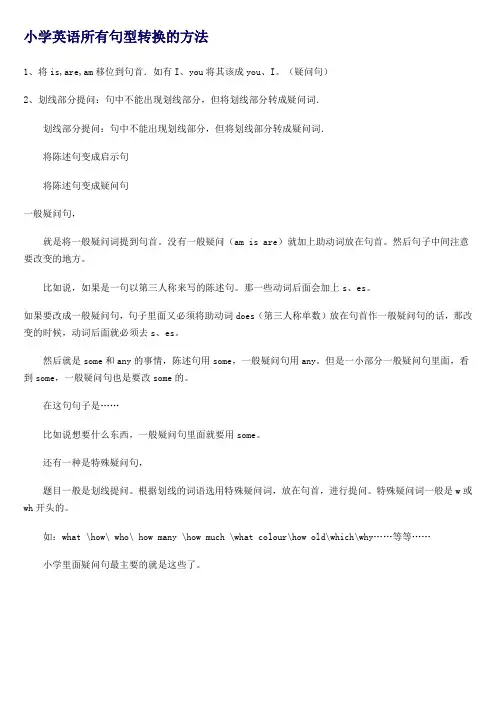
小学英语所有句型转换的方法1、将is,are,am移位到句首.如有I、you将其该成you、I。
(疑问句)2、划线部分提问:句中不能出现划线部分,但将划线部分转成疑问词.划线部分提问:句中不能出现划线部分,但将划线部分转成疑问词.将陈述句变成启示句将陈述句变成疑问句一般疑问句,就是将一般疑问词提到句首。
没有一般疑问(am is are)就加上助动词放在句首。
然后句子中间注意要改变的地方。
比如说,如果是一句以第三人称来写的陈述句。
那一些动词后面会加上s、es。
如果要改成一般疑问句,句子里面又必须将助动词does(第三人称单数)放在句首作一般疑问句的话,那改变的时候,动词后面就必须去s、es。
然后就是some和any的事情,陈述句用some,一般疑问句用any。
但是一小部分一般疑问句里面,看到some,一般疑问句也是要改some的。
在这句句子是……比如说想要什么东西,一般疑问句里面就要用some。
还有一种是特殊疑问句,题目一般是划线提问。
根据划线的词语选用特殊疑问词,放在句首,进行提问。
特殊疑问词一般是w或wh开头的。
如:what \how\ who\ how many \how much \what colour\how old\which\why……等等……小学里面疑问句最主要的就是这些了。
古人云“授人鱼,不如授人渔。
”古人尚且知道授人知识不如授人方法的道理,那么在各种理论高度发展的今天为什么就不能多重视一点方法和传授呢?句子教学是英语教学中的重要环节,有了句子作为基础,学生才能学好英语,也才能真正运用英语。
在几年的英语教学中,我总结了一些英语句子教学的小窍门,现简单归纳如下:一、肯定句改否定句的方法——一步法1、在be动词后加not。
如:is not , are not , am not, was not, were not;2、在can,should, will等后加not。
如:cannot, should not, will not;3、上述都没有的,在动词前加助动词否定形式don’t/doesn’t/didn’t。
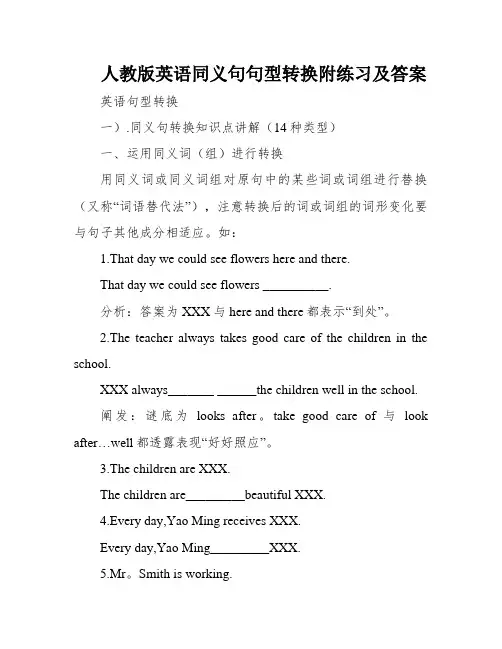
人教版英语同义句句型转换附练习及答案英语句型转换一).同义句转换知识点讲解(14种类型)一、运用同义词(组)进行转换用同义词或同义词组对原句中的某些词或词组进行替换(又称“词语替代法”),注意转换后的词或词组的词形变化要与句子其他成分相适应。
如:1.That day we could see flowers here and there.That day we could see flowers __________.分析:答案为XXX与here and there都表示“到处”。
2.The teacher always takes good care of the children in the school.XXX always_______ ______the children well in the school.阐发:谜底为looks after。
take good care of与look after…well都透露表现“好好照应”。
3.The children are XXX.The children are_________beautiful XXX.4.Every day,Yao Ming receives XXX.Every day,Yao Ming_________XXX.5.Mr。
Smith is working.Mr。
Smith is__________ __________.答案:1.in 2.hears from 3.at work二、运用反义词(组)的否定式进行转换即用反义词或词组的否定式表达与原句相同的意思,主要考查学生对反义词(词组)的积累和换位思维的能力。
如:1.It’s clear that this visit is d ifferent from last time.It’s clear that this visit is not the___ ___last time.分析:答案为same as。
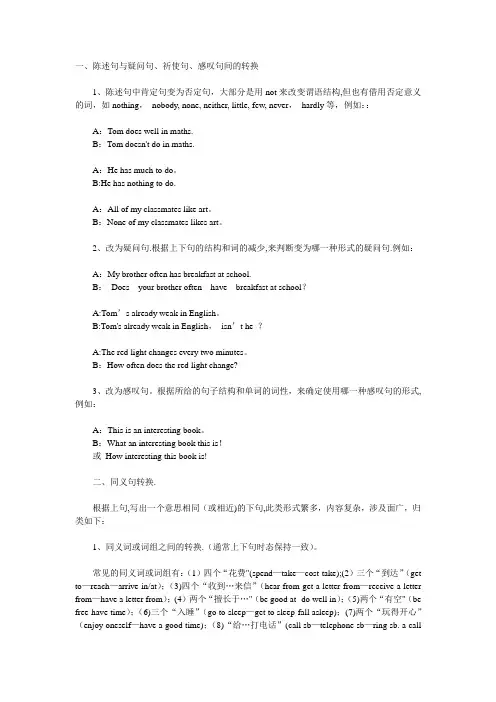
一、陈述句与疑问句、祈使句、感叹句间的转换1、陈述句中肯定句变为否定句,大部分是用not来改变谓语结构,但也有借用否定意义的词,如nothing,nobody, none, neither, little, few, never,hardly等,例如::A:Tom does well in maths.B:Tom doesn't do in maths.A:He has much to do。
B:He has nothing to do.A:All of my classmates like art。
B:None of my classmates likes art。
2、改为疑问句.根据上下句的结构和词的减少,来判断变为哪一种形式的疑问句.例如:A:My brother often has breakfast at school.B:Does your brother often have breakfast at school?A:Tom’s already weak in English。
B:Tom's already weak in English,isn’t he ?A:The red light changes every two minutes。
B:How often does the red light change?3、改为感叹句。
根据所给的句子结构和单词的词性,来确定使用哪一种感叹句的形式,例如:A:This is an interesting book。
B:What an interesting book this is!或How interesting this book is!二、同义句转换.根据上句,写出一个意思相同(或相近)的下句,此类形式繁多,内容复杂,涉及面广,归类如下:1、同义词或词组之间的转换.(通常上下句时态保持一致)。
常见的同义词或词组有:(1)四个“花费"(spend—take—cost-take);(2)三个“到达”(get to—reach—arrive in/at);(3)四个“收到…来信”(hear from-get a letter from—receive a letter from—have a letter from);(4)两个“擅长于…"(be good at -do well in);(5)两个“有空"(be free-have time);(6)三个“入睡”(go to sleep—get to sleep-fall asleep);(7)两个“玩得开心”(enjoy oneself—have a good time);(8)“给…打电话”(call sb—telephone sb—ring sb. a call—make a telephone to sb.)(9)“飞往...”(fly to...—go to...by air/plane)(10)“自学”(teach oneself —learn...by oneself)(11)在...方面帮助help...with...-help...(to)do...(12)在...差be weak in...-do badly in...(13)能/会...can-be able to(14)更喜欢...like...better than...—prefer...to (15)充满了…be full of…—be filled with…(16)放弃干…give up doing…—stop doing…(17)不再…no longer-not …any longer(18)照顾/保管take care of…-look after(19)展览on show—on display(20)阻止…干…stop…from doing—keep/prevent…from doing…(21)由于thanks to —because of…(22)举手hands up—put up one’s hands(23)最后,终于at last—in the end (24)与…不同be different from…—be not the same as…(25)从…借入…borrow…from…—lend…to…(26)乘公汽/火车/的士go to…by bus/train/taxi—take a bus /train/taxi to…(27)乘自行车去…go to…by bike—ride a bike to…(28)为…感到自豪be proud of…—be the pride of…(29)步行去…walk to…—go to…on foot (30)独自地by oneself -alone等。
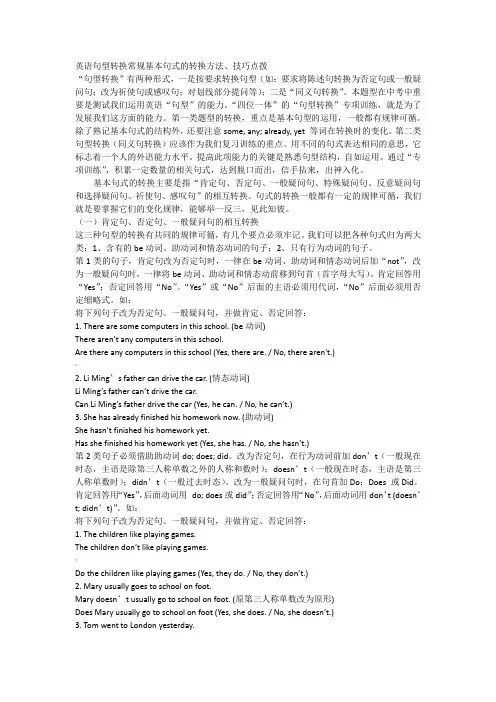
英语句型转换常规基本句式的转换方法、技巧点拨“句型转换”有两种形式,一是按要求转换句型(如:要求将陈述句转换为否定句或一般疑问句;改为祈使句或感叹句;对划线部分提问等);二是“同义句转换”。
本题型在中考中重要是测试我们运用英语“句型”的能力。
“四位一体”的“句型转换”专项训练,就是为了发展我们这方面的能力。
第一类题型的转换,重点是基本句型的运用,一般都有规律可循。
除了熟记基本句式的结构外,还要注意some, any; already, yet 等词在转换时的变化。
第二类句型转换(同义句转换)应该作为我们复习训练的重点。
用不同的句式表达相同的意思,它标志着一个人的外语能力水平。
提高此项能力的关键是熟悉句型结构,自如运用。
通过“专项训练”,积累一定数量的相关句式,达到脱口而出,信手拈来,出神入化。
基本句式的转换主要是指“肯定句、否定句、一般疑问句、特殊疑问句、反意疑问句和选择疑问句、祈使句、感叹句”的相互转换。
句式的转换一般都有一定的规律可循,我们就是要掌握它们的变化规律,能够举一反三,见此知彼。
(一)肯定句、否定句、一般疑问句的相互转换这三种句型的转换有共同的规律可循,有几个要点必须牢记。
我们可以把各种句式归为两大类:1、含有的be动词、助动词和情态动词的句子;2、只有行为动词的句子。
第1类的句子,肯定句改为否定句时,一律在be动词、助动词和情态动词后加“not”,改为一般疑问句时,一律将be动词、助动词和情态动前移到句首(首字母大写)。
肯定回答用“Yes”;否定回答用“No”。
“Yes”或“No”后面的主语必须用代词,“No”后面必须用否定缩略式。
如:将下列句子改为否定句、一般疑问句,并做肯定、否定回答:1. There are some computers in this school. (be动词)There aren’t any computers in this school.Are there any computers in this school (Yes, there are. / No, there aren't.)~2. Li Ming’s father can drive the car. (情态动词)Li Ming’s father can’t drive the car.Can Li Ming’s father drive the car (Yes, he can. / No, he can’t.)3. She has already finished his homework now. (助动词)She hasn’t finished his homework yet.Has she finished his homework yet (Yes, she has. / No, she hasn’t.)第2类句子必须借助助动词do; does; did。
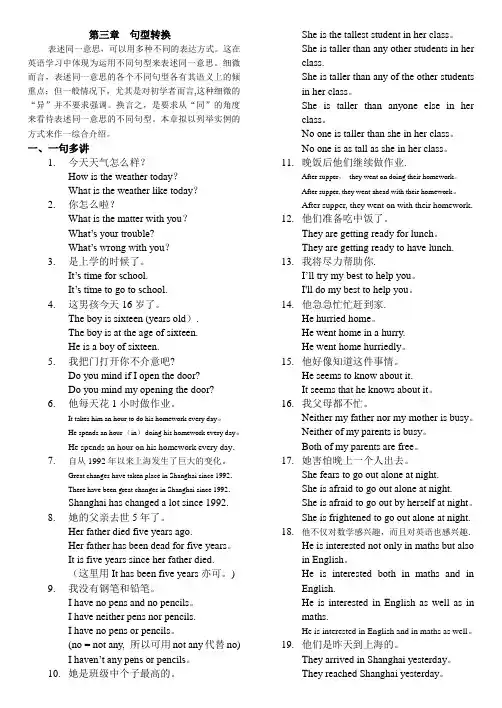
第三章句型转换表述同一意思,可以用多种不同的表达方式。
这在英语学习中体现为运用不同句型来表述同一意思。
细微而言,表述同一意思的各个不同句型各有其语义上的倾重点;但一般情况下,尤其是对初学者而言,这种细微的“异”并不要求强调。
换言之,是要求从“同”的角度来看待表述同一意思的不同句型。
本章拟以列举实例的方式来作一综合介绍。
一、一句多讲1.今天天气怎么样?How is the weather today?What is the weather like today?2.你怎么啦?What is the matter with you?What’s your trouble?What’s wrong with you?3.是上学的时候了。
It’s time for school.It’s time to go to school.4.这男孩今天16岁了。
The boy is sixteen (years old).The boy is at the age of sixteen.He is a boy of sixteen.5.我把门打开你不介意吧?Do you mind if I open the door?Do you mind my opening the door?6.他每天花1小时做作业。
It takes him an hour to do his homework every day。
He spends an hour (in)doing his homework every day。
He spends an hour on his homework every day.7.自从1992年以来上海发生了巨大的变化。
Great changes have taken place in Shanghai since 1992.There have been great changes in Shanghai since 1992.Shanghai has changed a lot since 1992.8.她的父亲去世5年了。
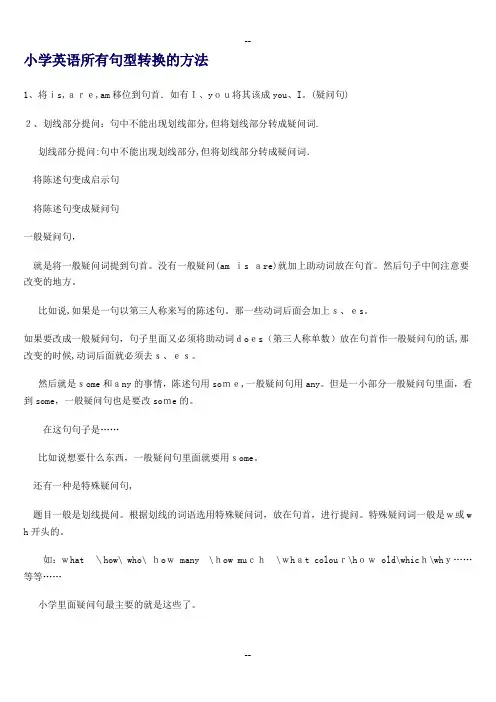
小学英语所有句型转换的方法1、将is,are,am移位到句首.如有I、you将其该成you、I。
(疑问句)2、划线部分提问:句中不能出现划线部分,但将划线部分转成疑问词.划线部分提问:句中不能出现划线部分,但将划线部分转成疑问词.将陈述句变成启示句将陈述句变成疑问句一般疑问句,就是将一般疑问词提到句首。
没有一般疑问(am is are)就加上助动词放在句首。
然后句子中间注意要改变的地方。
比如说,如果是一句以第三人称来写的陈述句。
那一些动词后面会加上s、es。
如果要改成一般疑问句,句子里面又必须将助动词does(第三人称单数)放在句首作一般疑问句的话,那改变的时候,动词后面就必须去s、es。
然后就是some和any的事情,陈述句用some,一般疑问句用any。
但是一小部分一般疑问句里面,看到some,一般疑问句也是要改some的。
在这句句子是……比如说想要什么东西,一般疑问句里面就要用some。
还有一种是特殊疑问句,题目一般是划线提问。
根据划线的词语选用特殊疑问词,放在句首,进行提问。
特殊疑问词一般是w或w h开头的。
如:what \how\ who\ how many \how much\what colour\how old\which\why……等等……小学里面疑问句最主要的就是这些了。
古人云“授人鱼,不如授人渔。
”古人尚且知道授人知识不如授人方法的道理,那么在各种理论高度发展的今天为什么就不能多重视一点方法和传授呢?句子教学是英语教学中的重要环节,有了句子作为基础,学生才能学好英语,也才能真正运用英语。
在几年的英语教学中,我总结了一些英语句子教学的小窍门,现简单归纳如下:一、肯定句改否定句的方法——一步法1、在be动词后加not。
如:is not , are not, am not, was not,were not;2、在can,should, will等后加not。
如:cannot, should not,will not;3、上述都没有的,在动词前加助动词否定形式don’t/doesn’t/didn’t。
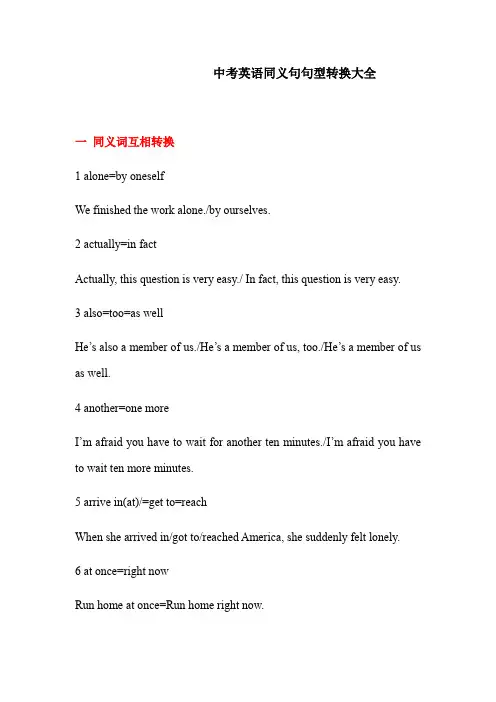
中考英语同义句句型转换大全一同义词互相转换1 alone=by oneselfWe finished the work alone./by ourselves.2 actually=in factActually, this question is very easy./ In fact, this question is very easy.3 also=too=as wellHe’s also a member of us./He’s a member of us, too./He’s a member of us as well.4 another=one moreI’m afraid you have to wait for another ten minutes./I’m afraid you have to wait ten more minutes.5 arrive in(at)/=get to=reachWhen she arrived in/got to/reached America, she suddenly felt lonely.6 at once=right nowRun home at once=Run home right now.7 continue/go onLet’s continue/go on reading the passage.8 cost=spend=take=pay(1)I spent ten yuan of/(in) buying this book../This book cost me tenyuan./I paid ten yuan for this book.(2)It took us three days to fulfill this task./We spent three days on thistask/in fulfilling this task.9 cross=go acrossBefore crossing/going across the road, please look both sides.10 sometimes/=t timesHe is a good man, but he can be really bad-tempered sometimes./at times.11 die/=ose one’s lifeThose people died/lost their lives during the earthquake.12 now/at the momentShe is talking about the problem with her classmates now./at the moment 13 else=otherWhat else/other things can you see in the picture?14 then=t that moment/at that timeShe was shopping then/at that moment/at that time, so she knew nothing about it.15 like/love/enjoy/be fond of/be interested in/care forShe likes/enjoys/loves/is fond of/is interested in/cares for collecting stamps very much.16 will/be going to/be about toThe teachers will/are going to/are about to have a meeting tomorrow afternoon.17 want/would likeDo you want to go abroad to study further?/Would you like to go abroad to study further/18 can/be able to/have the ability to doCan you tell me the way to the library?/Are you able to tell me the way to the library?/Do you have the ability to tell me the way to the library?19 visit/call onLin Tao visited/called on his grandparents last week.20 favorite/like bestWhat’s your favorite sport?/What sport do you like best?21 happen/take placeWhat happened?/What took place?22 decide/make a decision/make up one’s mindShe can’t decide/make a decision/make up her mind where to go.23 found/establish/set upThe students founded/established/set up a group to protect the environment.24 finally/at last/in the endFinally/At last/In the end, she won the race.25 leave/be awayHe left yesterday./He has been away for a day.26 return/give backHe hasn’t returned the book to me./He hasn’t given the book back to me. return/go backHe will go back/return in a month.27 why/what for/how come-She cried so badly. –How come?What did she cry so sadly for?/Why did she cry so badly?28 over/more thanOver/More than a hundred people tried this new kind of food.29 whatever/no matter whatWhatever/No matter what you find in the box, they belong to Amy.30 whenever/no matter whenWhenever/No matter when you come to see me, I will treat you as my relative.31 walk/ go…on footDo you walk to school every day?/Do you go to school on foot every day?32 should/ought to/be supposed toWe should/ought to/are supposed to use both sides of the paper to reduce wastes.33 population/peopleWhat is the population of China?/How many people are there in China?34 quit/stop/drop/give upMy father quitted/stopped/dropped/gave up smoking.35 maybe/perhaps/may beMaybe/Perhaps it is not my pen./ The pen may not be mine.二同义词组互相转换1 a lot of/lots ofA lot of/Lots of artists will show their faces at the party.2 all over the world/around the worldEnglish is spoken widely all over the world./around the world3 not as(so)…as/less thanThis book is not as(so) interesting as that one./That book is more interesting than this one.4 as…as possible/as…as sb canRun home as fast as possible/as fast as you can to tell your mother the good news.5 at risk/in danger/in troubleThe pandas in our country are at risk./in trouble/in danger6 at the age of…/when sb.+be+…years oldHis parents died when he was six years old./His parents died at the age of six.7 because of/due to/as a result of/with one’s help/thanks toBecause of?/Due to/As a result of his help, he passed this exam.With his help/With the help of him, he passed the exam./Thanks to his help, he passed the exam.8 be careful/look out/take careLook out!/Be careful/Take care! The flood is coming.9 be worried about/worry aboutLiu Ming is worried about his following oral test./Liu Ming can’t stop his following oral test.10 both…and…/not only…but also…He is not only a singer but also a doctor./He is both a singer and a doctor.11 be good at/do well inHe is good at drawing./He does well in drawing.12 be proud of/take pride inWe are all proud of our country’s astronaut./He takes pride in ourcountry’s astronaut.13 come up with/think of/have an ideaTome came up an idea./Tom thought of an idea./Tom had an idea.14 ride a bike/go…by bikeHe often rides a bike to work./He often goes to work by bike.15 come from/be fromWhere do you come from?/Where are you from?16 have a good time/enjoy oneself//play happilyWe had a good time/enjoyed ourselves/played happily on Christmas Day.17 have a pain in head/have a headacheHe didn’t go to school today, because he had a pain in head./had a headache18 hear from/receive(get) a letter fromShe is very happy to hear from/receive a letter from a Canadian friend. 19 had better do/It’s best to doYou had better read in the sun./It’s best for you to read in the sun.20 how about/what aboutHow about/What about going skating?21 in order to/in order that/to do/so thatHe worked day and night to be a successful man./He worked day and night in order to be a successful man./He worked day and night in order that he could be a successful man./He worked day and night so that he could be a successful man.22 keep off/keep away fromKeep off /Keep away from the grass!23 in/wearShe is in/wears a white dress today.24 keep sb. from doing/stop sb. (from) doing/prevent sb. (from) doing Trees can stop the soil flowing away./ Trees can prevent the soil flowing away./Trees can keep the soil from flowing away.25 learn …by oneself/ teach oneselfNobody taught him. He learnt it by himself./He taught himself.26 like …better than/prefer…to…/prefer to do…rather than do …John likes swimming better than skating./John prefers swimming to skating./John prefer to swim rather than skate.27 long, long ago/once upon a timeLong, long ago/Once upon a time, there was a beautiful princess living in an old castle.28 look after well/take good care ofThanks for looking after my cat /taking good care of my cat well while I was away.29 no longer/not …any longerShe is no longer a little girl./She is not a little girl any longer.30 shall we/Let’s..Shall we watch the film together?/Let’s watch the film together.31 take part in/join in/participate inHe took part in /joined in/participated in the match.32 too…to/so…that…/enough to…He is too busy to visit us./He is so busy that he can’t visit us./He is not free enough to visit us.三同义句型互相转换1运用两种时态(一般过去时和现在完成时互相转换)(1)He left last year.(2)He has been away for one year.(3)He has been away since a year ago.(4)It is a year since he left.(5)One year has passed since he left.2最高级和比较级的互相转换(1)He is the tallest student in his class.(2)He is taller than any other student in his class.(3)He is taller than the other students in his class.(4)No one else is taller than him in his class.3运用两种语态(主动语态和被动语态互相转换)I clean my room every day./My room is cleaned every day. 4感叹句的两种句型之间互相转换What a careful girl she is!/How careful the girl is!5运用关联词语合并句子(1)Amy can’t dance. Susan can’t, either.Neither Amy nor Susan can dance.(2)I has eaten breakfast and my mother has eaten it, too.Both my mother and I have eaten breakfast.6运用复合句和不定式互相转换(1)I hope that I can visit the moon one day./I hope to visit the moon oneday.(2)He told me how he could use a computer./He told me how to use acomputer.7运用不同的句式结构互相转换(1)She wants to go shopping and her friends want to go shopping,too./She wants to go shopping, and so do her friends.(2)He went to bed after he finished his homework./He went to bed afterfinishing his homework./He didn’t go to bed until he finished his homework.(3)Come on, or we’ll miss the early bus./If we don’t hurry, we’ll miss theearly bus.(4)The man gave us a talk last week, and he will give us another talk thisweek./The man who gave us a talk last week will give us another talk this week.8用it做形式主语互相转换(1)He can finish the work easily./It is easy for him to finish the work.(2)We found it hard to shake./We found it was hard to skate.。
专题三、句型转换【知识盘点】句型转换这一题型是先给出一个句子,然后再给出一个包含几个空白处的句子,要求根据括号内的具体要求在第二句的空白处填入适当的词来完成。
它有完全的句式转换和句子中某一部分或几部分的转换。
该题型主要考查同学们的语言基础知识及句子结构的构成、变化、运用等。
其特点是规律性强、灵活性小,旨在考查考生用不同的句型结构来表达相同、相近或相反的语意的能力,训练灵活运用语言的技巧。
【命题规律】从题型上看,句型转换可分为两大类:一是按要求改写句子。
即按照指定要求将原句改写成其他形式的句子,如肯定句改为否定句,陈述句改为一般疑问句、特殊疑问句、反意疑问句、感叹句,对划线部分提问等。
另一类是同义句、近义句的转换,即要求用不同的句型,不同的语言手段表达相同的思想。
【命题趋势】从近年来的考题趋势来看,句型转换从单纯测试语法知识向改变句子结构填空,填词后使句意不变或与要求相符的方向发展。
其中许多属于常用句型。
【解题技巧】一、肯定句改为否定句1. 改变谓语结构在系动词be, become, feel, smell等,助动词be, have, do 等以及情态动词can, may, should等后加not。
如果句子的谓语中不是以上这些词,而是行为动词,则相应地将动词的原形,第三人称单数或过去式变为否定形式。
如:He has seen the film before.→He hasn’t seen the film before.He will write the book in two months.→He won’t write the book in two months.He does his homework in the evening.→He doesn’t do his homework in the evening.2. 用含否定意义的词(如never, nothing, nobody, none, neither, little, few等)。
句型转换之同义句转换1. Give the purse to me.Give ____ the purse .2. She is going to get up at six o ' clock.She _____ ____ _____ at six o'clock.3. What date is it today? the date today?4. It ' s time for breakfast.It ' s time _________ breakfast.5. What' s the time?______ time is ______ ?6. I would like a toy bike as my birthday present.I ________ _______ have a toy bike as my birthday present.7. I was born on the fifth of December._____ _____ _______ on the fifth of Dec.8. My friends buy me some flowersMy friends _________ some flowers ________ me.9. My friends give me some birthday cards.My friends _________ some birthday cards _________ me.10. Reading is interesting._________ is _________ __________ read.11. Mr. Zhou often drives a car to work.Mr. Zhou often goes to work _____ _______ .12. Do you usually come here by bus?Do you usually ______ a ______ here?13. Kangkang often rides a bike to school.Kangkang often ____ ________ ______ ________ _______ 14. It ' s time to have lunch.It ' s ______ _____ _______ .15. I like reading books in the library.I ______ _______ books in the library.16. He likes apples, too.He _____ _______ apples.17. What' s your favorite subject?What subject _____ you ________ __________ ?18. How do you like science?_______ do you _______ _________ science?19. It ' s time to have the meeting.It ' s time ______ the meeting.20. Why don't you play basketball with us?Why ______ play basketball with us?21. I sit in front of her. (同义句转换)She ______ _____ me.22. I have a TV set in the living room. (同义句转换)_____ ______ a TV set in ____ living room.23. He would like to visit his grandparents tomorrow. (同义句转换)He _____ _______ _______ his grandparents tomorrow.24. There is something wrong with the piano. 同(义句转换)The piano _________ __________ .25. What' s the matter with you?同义句转换)________ _________ with you?26. Her home is not far from mine. (同义句转换)My home ______ __________ to hers.27. There are many apples in the box.同义句转换)There are ______ _______ _______ apples in the box.28. There are no houses near the garderlW义句转换)There _______ _________ _________ houses near the garden.29. Zhou Jun goes to bed after she finishes her homework同义句转换)Zhou Jun ______ ____ to bed _____ she finishes her homework.30. I get there after him. (同义句转换)He _______ there ______ m e.31. Take the second turning on the right.同义句转换)______ _________ at the second turning.32. Where' tshe supermarket? 同(义句转换)______ can I _____ _______ the supermarket?33. Ming Ming walks to school every day. (改为同义句)Ming Ming ______ to school ___________ every day.34. Thank you for help ing me.(同义句)Thank you for _____ ____ .35. There aen' t any pears in the bo同义句)There are ______ pears in the box.36. Whose are these clothes同义句)_____ _____ are these?37. Let me look at your book.(同义句)Let me _____ _____ _____ _____ your book.句型转换之- 同义句转换答案I. me 2. will get up 3. What is 4. to have 5. What, it 6.want to 7. My birthday is 8. give, for 9. buy, for 10. It , interesting toII. by car. 12. take ,bus 13. goes to school by bike 14. time for lunch 15. enjoy reading 16.also likes 17. do , like best18. What , like about 19. for 20. not 21. sits behind 22. There is ,my23. want to visit 24. is broken 25. What's wrong26. is near 27. a lot of 28. aren't any other 29. doesn't go , before30. gets , before 31. Turn right 32.How, get to 33. goes, on foot 34. your help 35. no 36. Whose clothes 37. have a look at。
同义句转换的⽅法()“同义句转换”是根据基本句,在改写句的若⼲空格中填写适当的词,使两句意思相同或相近,以此考查答题者灵活运⽤英语的不同表达形式的能⼒和逻辑思维能⼒。
这个题型的特点是每个⼩题给出两个句⼦,第⼀句为原句,第⼆句是改写句。
第⼆句中留出若⼲空格,要求在空格上填⼊适当的词,使之与第⼀句的意思相同或相近。
做这种题型⼀般有下列⼏种⽅法:(1)替换法。
⽤同义词、同义短语、反义词或反义短语等办法来替换原句中的有关部分,使句意不变。
1)⽤同义词或同义短语替换(句后括号中的词为参考答案)。
①She got to China in 1950.She____China in 1950.(reached)②Be careful with your handwriting._____to your handwriting.(pay attention)2)⽤反义词或反义短语替换。
①She hardly speaks at the meeting.She____ ____ ____at the meeting.(almostdoesn’t,speak)②My watch doesn’t work well.Something___ ___ ___my watch.(is, wrong,with)3)⽤短语替换从句或⽤从句替换短语,例:①After we had breakfast,we went to school.____,we went to school.(After,breakfast)②We can’t finish the work without your help.We can’t finish the work____you_____us.(if,don’t,help)(2)转换法。
这种⽅法是⽤不同句型、句式、语态、引语等⽅法改写句⼦,使其意思相同。
1)句型转换(这种转换通常是⽤另⼀种句型替换原来的句型)。
英语同义句转换技巧英语同义句转换技巧引言英语同义句转换是提高英语表达能力的重要一环。
通过将句子重新表达,可以增强句子的多样性和准确性。
本文将介绍几种常用的技巧来实现英语同义句转换。
1. 同义词替换•将句子中的某些单词替换为其同义词,以改变句子的意思和表达方式。
例如:–“I am tired.” 可以转换为“I am exhausted.”(将”tired”替换为”exhausted”)–“The weather is hot.” 可以转换为“The weather is sweltering.”(将”hot”替换为”sweltering”)2. 主动语态转被动语态•将句子从主动语态转换为被动语态,以改变句子的结构和语气。
例如:–“She painted the picture.” 可以转换为“Thepicture was painted by her.”(将”she”改为”thepicture”,将”painted”改为”was painted”,加上”by her”)3. 句子结构调整•改变句子的结构和语序,以达到同义句的目的。
例如:–“I saw him in the park.”可以转换为“In the park,I saw him.”(将”in the park”移到句首)–“The cat caught the mouse.” 可以转换为“Caught by the cat, the mouse.”(将”the cat”和”themouse”的位置互换)4. 词性转换•改变单词的词性,以实现同义句转换。
例如:–“She runs fast.” 可以转换为“She is a fastrunner.”(将”run”改为”runner”,加上”is a”)–“He is very strong.” 可以转换为“His strength is remarkable.”(将”strong”改为”strength”和”remarkable”)5. 句型转换•改变句子的结构或句型,以达到同义句的目的。
小学英语所有句型转换的方法1、将is,are,am移位到句首.如有I、you将其该成you、I。
(疑问句)2、划线部分提问:句中不能出现划线部分,但将划线部分转成疑问词.划线部分提问:句中不能出现划线部分,但将划线部分转成疑问词.将陈述句变成启示句将陈述句变成疑问句一般疑问句,就是将一般疑问词提到句首。
没有一般疑问(am is are)就加上助动词放在句首。
然后句子中间注意要改变的地方。
比如说,如果是一句以第三人称来写的陈述句。
那一些动词后面会加上s、es。
如果要改成一般疑问句,句子里面又必须将助动词does(第三人称单数)放在句首作一般疑问句的话,那改变的时候,动词后面就必须去s、es。
然后就是some和any的事情,陈述句用some,一般疑问句用any。
但是一小部分一般疑问句里面,看到some,一般疑问句也是要改some的。
在这句句子是……比如说想要什么东西,一般疑问句里面就要用some。
还有一种是特殊疑问句,题目一般是划线提问。
根据划线的词语选用特殊疑问词,放在句首,进行提问。
特殊疑问词一般是w或wh开头的。
如:what \how\ who\ how many \how much \what colour\how old\which\why……等等……小学里面疑问句最主要的就是这些了。
古人云“授人鱼,不如授人渔。
”古人尚且知道授人知识不如授人方法的道理,那么在各种理论高度发展的今天为什么就不能多重视一点方法和传授呢?句子教学是英语教学中的重要环节,有了句子作为基础,学生才能学好英语,也才能真正运用英语。
在几年的英语教学中,我总结了一些英语句子教学的小窍门,现简单归纳如下:一、肯定句改否定句的方法——一步法1、在be动词后加not。
如:is not , are not , am not, was not, were not;2、在can,should, will等后加not。
如:cannot, should not, will not;3、上述都没有的,在动词前加助动词否定形式don’t/doesn’t/didn’t。
英语句型转换常规基本句式的转换方法、技巧点拨“句型转换”有两种形式,一是按要求转换句型(如:要求将陈述句转换为否定句或一般疑问句;改为祈使句或感叹句;对划线部分提问等);二是“同义句转换”。
本题型在中考中重要是测试我们运用英语“句型”的能力。
“四位一体”的“句型转换”专项训练,就是为了发展我们这方面的能力。
第一类题型的转换,重点是基本句型的运用,一般都有规律可循.除了熟记基本句式的结构外,还要注意some, any; already, yet 等词在转换时的变化。
第二类句型转换(同义句转换)应该作为我们复习训练的重点.用不同的句式表达相同的意思,它标志着一个人的外语能力水平。
提高此项能力的关键是熟悉句型结构,自如运用.通过“专项训练”,积累一定数量的相关句式,达到脱口而出,信手拈来,出神入化。
基本句式的转换主要是指“肯定句、否定句、一般疑问句、特殊疑问句、反意疑问句和选择疑问句、祈使句、感叹句"的相互转换。
句式的转换一般都有一定的规律可循,我们就是要掌握它们的变化规律,能够举一反三,见此知彼。
(一)肯定句、否定句、一般疑问句的相互转换这三种句型的转换有共同的规律可循,有几个要点必须牢记。
我们可以把各种句式归为两大类:1、含有的be动词、助动词和情态动词的句子;2、只有行为动词的句子。
第1类的句子,肯定句改为否定句时,一律在be动词、助动词和情态动词后加“not”,改为一般疑问句时,一律将be动词、助动词和情态动前移到句首(首字母大写)。
肯定回答用“Yes”;否定回答用“No".“Yes”或“No"后面的主语必须用代词,“No”后面必须用否定缩略式.如:将下列句子改为否定句、一般疑问句,并做肯定、否定回答:1。
There are some computers in this school。
(be动词)There aren't any computers in this school。
一、同义句改写,每空一词1. A plane is a kind of machine and the machine can fly. (改为同义句)A plane can fly.2. It used to take me a lot of time to stay outdoors at night in summer when I was young. (改为同义句)I used to ______ a lot of time _____ outdoors at night in summer when I was young.3. It makes my listening skills better. (改为同义句)It _________________ my listening skills.4. What the teacher said is so hard that he can't understand it.. (改为同义句)It's_____________ hard__________ him________ understand what the teacher said.5. Tom would rather take a walk rather than stay at home. (改为同义句)Tom prefferred ____________a walk to ____________home.6. How can the eight-year-old boy save an adult? (改为同义句)How can the boy of eight ____________ old save an adult’s _________7. The scenery is strongly impressed on my mind. (改为同义句)I’m very___________ _______ the scenery.8.What can we do with these books ? (改为同义句)________ can we ________ with these books?9. Kelly usually keeps the window open when she sleeps. (改为同义句)Kelly usually sleeps the window .10.The poor mother doesn’t have enough money to send her child to school. (改为同义句)The poor mother can’t pay for her chi ld’s education.11. What will you do if your parents don’t allow you to join us? (改为同义句)your parents don’t allow you to join us?12. Social situations don’t bother you at all if you are confident enough. (改为同义句)Social situa tions don’t bother you if you are confident enough.13. Work hard, or you’ll make me disappointed.(改为同义句)Work hard, or you’ll .14. I would hurry to call the hospital if I saw an accident in the street. (改为同义句)I would call the hospital if I saw anaccident in the street.15. Her money ran out in the bookstore. (改为同义句)His money was ________ _________ .16. You are from Be ijing. I’m from Beijing ,too. (改为同义句)________ ________ you _________ ________I am from Beijing .17.Our school football team won the prize for the football match yesterday. (改为同义句)The Price of the football match _______ _______our school football team yesterday.18.You should shake hands when you meet someone in China for the first time. ( 改为同义句)You ___ ___ ___ __hands when you meet someone in China for the first time 19.The coat is too expensive for me. (改为同义句)The coat ______ ______ ______ ______ me .20. Who is the owner of the red bicycle?Who ________ the red bicycle __________ ____________? (同义句)21. They have run out of all the paper already. (同义句)They have ________ ________ all the paper already.22.Tina and Peter got married two years ago. (改为同义句)Tina_____ _____ ______Peter two years ago.23. My car broke down yesterday. I can’t go there with you. (改为同义句)There was _____________- with my car yesterday. I can’t go there with you.24. Her parents often provide lots of money for her. (改为同义句)Her parents often ________ _______ _________ lots of money.25.You shouldn’t behave like that at the table. (改为同义句)You ________ _________ to behave like that at the table.26. How was your visit to France last month?________ was your visit to France ________ last month? (改为同义句)27. My French has become better. (改为同义句)My French has ________.28. Lucy has made up her mind that she won’t do that again.(改为同义句)Lucy has _______ _______ to do that again.29. I'm sure that man is Mr. Green. (改为同义句)That man ________ ________ Mr. Green.30. It began to rain so they didn't go window-shopping. (改为同义句)They didn't go window-shopping ________ ________ the rain.二、同义句改写,每空一词1. This is the most boring journey that I have ever heard of.I have ________ heard of ________ a boring journey before.2. My father seems to be very angry.________ seems that my father ________ very angry.3. He could do it well.He ________ ________ ________ do it well.4. The captain is the happiest of all the players.The captain is ________ ________ any other player.5. Taking exercise often can make you healthy.It's good ________ your ________ to take exercise often.6. The children played happily in the zoo yesterday.The children ________ ________ in the zoo yesterday.7. The problem is too difficult for me to work out.The problem isn't ________ ________ for me to work out.8. Hurry up, and you'll be on time for the party.________ you ________ hurry, you'll be late for the party.9. It is five years since he left his hometown.He has ________ ________ from his hometown for five years.10. The film began at 2:00 p. m. and ended at 4:30 p. m.The film ________ two and a half ________.11. That lady is my new English teacher. She is wearing red clothes.The lady ________ ________ is my new English teacher.12. With a polite goodbye, Mr. Green left the house.________ ________ good-bye politely, Mr. Green left the house. 13. I spent four hundred yuan in buying that recorder.That recorder ________ ________ four hundred yuan.14. “Can I borrow your bike?” he asked me.He asked me ________ I ________ ________ him the bike.15. There are more people in America than in England.The ________ in America is ________ than ________ in England.16. He can't decide where he should stay for the night.He can't decide ________ ________ ________ for the night.17. You needn't thank me, sir.________ ________ ________ for you to thank me.18. The ID card is not the only thing that I have lost.The ID card is not the only thing ________ ________.19. How is the weather in Shanghai?What ________ ________ ________ does Shanghai have?20. His father has been dead for two years.It's two years ________ his father ________.21. Tom didn’t watch TV that evening. He listened to music.Tom listened to music ______ ______ watching TV that evening.22. “Will you go home tomorrow?” the mother asked her son.The mother asked her son ________ he ________go home the next day.23. Mr. Smith wanted to know where he could get the information.Mr. Smith wanted to know ________ ________ get the information.24. You can do it in class. You can also do it at home.You can do it ________ in class ________ at home.25. “I’ll return the DVDs to Mary as soon as possible”, said Mike.Mike said he ___________ ___________ back the DVDs to Mary as soon as possible.26. Don’t throw waste paper on the ground, please.You ___________ ___________ to throw waste paper on the ground.27. Tom can’t speak French. Jack can’t speak French, either.__________ Tom __________ Jack can speak French.28. Mike will come if you invite him.Mike __________ come __________ you invite him.29. The small boy stopped crying after he saw his mother.The small boy ___________ stop crying ___________ he saw his mother.30. The fish will go bad, so you’d better put it in the fridge.The fish will go bad __________ you __________ put it in the fridge.二.1. never; such 2. It; is 3. was able to 4. happier than 5. for; health 6. enjoyed themselves 7. easy enough 8. If; don't 9. been away 10. lasted; hours 11. in red 12. After saying 13. cost me 14. if/whether; could lend 15. population; larger; that 16. where to stay 17. There's no need 18. that's missing 19. kind of weather 20. since; died 21. instead of 22. whether/if; would 23. where to 24. either; or 25. would, give 26. aren’t’ allowed / ought to 27. Neither nor 28. won’t unless 29. didn’t, until30. if, don’t。